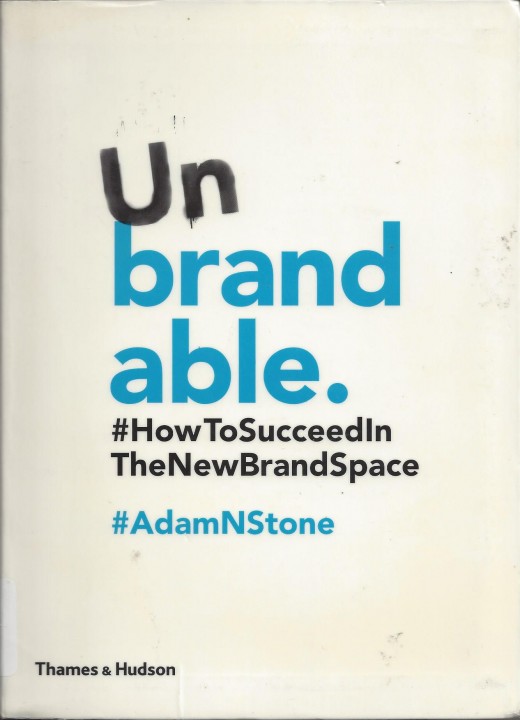Book Review: 'Unbrandable'
Introduction
The advantage of branding is that you can focus on brands and brand awareness regardless of technology or changes to social media platforms. The challenge comes in when a product, service, organization or group is hard to brand beyond its name. Yet that “marketplace” is crowded. What can you do to stand out from the crowd and remain credible at the same time when marketing your product or business? That’s “Unbrandable”, a marketing book by Adam Stone, tries to answer, with varying degrees of success.
What are the pros and cons of this marketing book?

Strengths of the Book Unbrandable
The author clearly defines what makes some groups or organizations successful despite branding or lack thereof. These groups manage to make money and maintain a following despite their evolution over time. And not having a set brand makes it easier to change than having to shift the market perception of your brand (more like trying to move an iceberg than here’s our latest product/service and going on). He gives many case studies of successful “unbranded” groups and how they were able to succeed without branding.
How do you engage customers and build a loyal tribe? How do you tell your story and come across as authentic and genuine, thus standing out in a world of many artificial, corporate brands? “Unbrandable” discusses ways others have achieved this that readers could replicate, including but more than just social media outreach.
The author gives a good explanation of brands versus products. The product is what people buy; the brand is the emotions it is supposed to evoke, the personality is supposedly has.
Authenticity stands out as a trait that people seem to crave in an increasingly detached, digital world. The author is right that if people give up their local roots, place in the community for a shiny, emotionally empty hip image, they lose their loyal customers while failing to attract new ones.
The advice of building a good product people can use how they want, whether Minecraft or versatile and economical physical goods, is too often overlooked in the rush to add as many features as possible, regardless of utility or price.
Strikes Against Unbrandable
The author states that the Millennial generation is unbrandable, not loyal to brands or consumerism. Obviously he hasn’t had to argue with someone that Dunkin Donuts coffee is as good and cheaper than Starbucks, that Apple isn’t perfect and owning their devices proof that someone is cool.
The author bashes mass marketing but ignores the fact that it was enabled by mass media like radio, and later, TV. There were a few national magazines, while you had one or two local newspapers. You had large audiences with only a few marketing channels available aside from word of mouth. He doesn’t see the connection between technology of the time and how marketers utilized it. He does recognize that the internet has created many more marketing channels, niche marketing, and increasingly, personalized marketing.
Adam Stone overhypes sustainability as necessary for any brand; he does not seem to realize that this may be a type of virtue signaling appreciated by Millennials but isn’t necessary or even relevant to many other market segments.
He hates consumerism and bashes it repeatedly in the book, ignoring how the consumer society is why there are many areas in the developing world that have Coke deliveries more regularly than clean water. He also ignores the fact that it is only capitalism that has lifted several billion people out of poverty, something so demonstrable that Bono changed his mind to say we need to embrace capitalism to lift the remaining bottom billions out of the grinding poverty that used to be the human norm. He bashes consumerism and capitalism so much he features an unnamed “off the grid” person as a moral paragon. Practicality is irrelevant to the moralizing, and his politics colors the entire book, including the valuable marketing lessons.
Observations
Search engines are giving extra weight to brands over key search terms, yet individuals are becoming increasingly disloyal to most brands. The author is right that part of this is due to the Great Recession that officially ended around 2010 but in reality lasted years longer. And part of it is due to cultural shifts, market fragmentation and generic brands that cater to people based on price. This creates a contradiction for digital marketers where branding increases your site’s SEO – while doing far less to actually entice potential customers. The author does share classic branding advice like consistency, reliability, authenticity.
The author of “Unbrandable” is right that cultural currency increasingly has an economic value and literal impact; trust scores and domain authority of websites are an attempt to measure exactly that.
For a book that mixes lectures on multi-culturalism and authenticity, repeating stories that harken back to the old view that Europe is the center of real culture (London, Berlin, Rome, the Netherlands) versus the upstart American culture is ironic.
Summary
Do you want to know how to build an authentic, approachable brand? Do you want to know what the digital Millennial generation craves? “Unbrandable” answers those questions. How do you market a product to diverse market niches? That is better answered in other works.
The book would be better if the author weren’t centered on Millennials as a market segment and demographic group, assuming that what they like today is the future of marketing and what they like now is what all companies should be trying to offer. That narrow focus followed by overly broad generalization he unselfconsciously assumes must be true hurt the value of the book with a broader audience.






